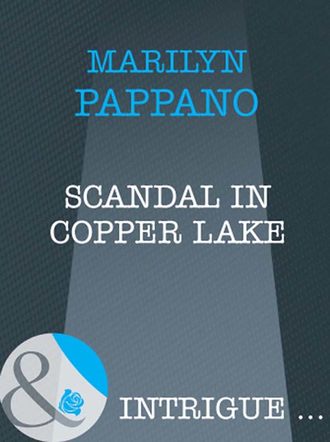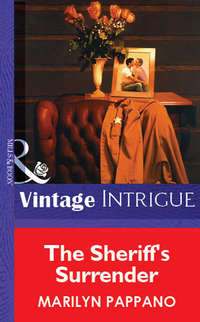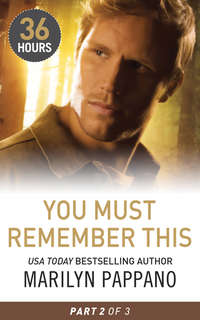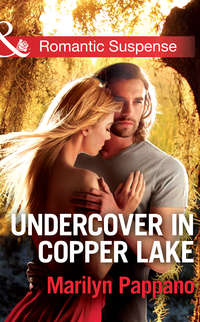
Полная версия
Scandal in Copper Lake
Her hair was up that afternoon, baring that long, lovely neck, and her lids were heavy, as if the heat of the day and the peace of the porch had lulled her someplace else. But that, Robbie thought, was an act. She was as aware of him as he was of her.
After a moment, the rocking stopped and she let her leg slide down. Both feet were bare except for a coat of deep red polish on the toenails. No toe ring. No bracelet circling her delicate ankle.
“Robbie Calloway,” she said at last.
“How did you know? Oh, my God, you must be psychic,” he said drily. Crossing the porch, he sat in another rocker that creaked with each backstroke.
She smiled at his response. “It’s been a long time since you’ve gone anywhere in Copper Lake without being recognized. After all, you’re not just a Calloway. You’re one of the Calloways. You, your brothers, your mother—you’re considered the best of the best.”
“And you know this…?”
“I’m psychic, remember? And I read the paper. I talk to people.” She leaned forward and extended her right hand. “I’m—”
“Anamaria Duquesne. You scam people for a living.” He took her hand as he spoke and felt her muscles tighten at his remark. She didn’t try to pull away, though, even if he was holding on far too long for a handshake. Her skin was soft and warm, and it made him wonder if she felt like that all over. She was gorgeous with her clothes on. He could only imagine how stunning she would be with them off.
When he let go of her hand, she sat back and crossed one leg over the other. “You know what they call ten lawyers at the bottom of the sea? A good start. You have some nerve, criticizing what I do for a living.” Her voice was soft, fluid, the accent pure coastal Georgia. It was a voice that could quiet a cranky child, soothe a troubled soul or arouse a man until he hurt. If she ever took her clairvoyant nonsense to the radio, every man within listening range, believer or not, would tune in just to hear that voice.
“I understand you used to live here,” he said.
“A long time ago.”
“Why are you here now?”
She smiled faintly. “Because I used to live here. Why are you here?” Before he could answer, she went on. “Let me guess. Harrison Kennedy asked you to check me out.”
“Do you blame him?”
Her brows arched as she shrugged. “I’ve done nothing wrong.”
“You have an arrest record.”
Another shrug. “You would have one, too, if you weren’t a Calloway, and for more serious charges than my own.”
Robbie couldn’t argue the fact with her. He and his brothers had gotten into a lot of trouble when they were kids. There was no doubt that the family name, as well as Granddad, had kept them out of jail on more than one occasion.
“What do you call what you do?” he continued.
“A gift. Sometimes, not so much.”
He gestured. “Are you a psychic? Seer? Reader? Palmist? Do you have a sign outside your house in Savannah that says Sister Anamaria Sees All, with an evil eye and a palm, a moon and some stars?”
“I’m an advisor. No signs.”
“Then how do your customers find you?”
“Everyone in Savannah knows where to find Mama Odette’s girl.” Uncrossing her legs, she stood gracefully. Her skirt flowed around her in psychedelic ripples. “Would you like a glass of fresh-squeezed lemonade? I use Auntie Lueena’s recipe. I’m sure you know who she is.”
“Sure. Why not?”
She went to the door, opened it, then turned back to give him a devilish smile. “And I promise, Robbie Calloway, I won’t doctor it with anything. Healing or otherwise.”
It took only a moment to fill two glasses with ice, another to remove the pitcher from the refrigerator. Balancing it all, she carried it through the quiet house and onto the porch. The pitcher was already sweating when she set it on a small table, then filled the glasses.
“What is it exactly that Mr. Kennedy wants to know about me?” She handed one glass to Robbie, careful not to touch him, then sat down again in Mama’s rocker, cradling her own glass between her palms.
“Who you are. Why you’re here. What you’re up to.”
“You know who I am. Do I need an explanation for coming to stay at a house I’ve owned for twenty-three years? As for what I’m up to…I’m resting. Taking a break from my regular life. Retreating.” After a long drink of lemonade, she went on. “I suspect Mr. Kennedy’s primary interest is what I want with Miss Lydia.”
“What do you want with Miss Lydia?”
“For me, nothing. My mother had a message for her that I agreed to pass on.”
Skepticism crossed Robbie’s face. “You talk to your dead mother?”
Ignoring the sting of pain deep inside, Anamaria shook her head. “I don’t have that ability. She speaks to my grandmother.” As a small child, Anamaria would have been afraid to suddenly hear Mama’s voice again. As a teenager, she would have given a lot to hear her say one more time, Everything’s gonna be all right, baby doll. As an adult, she felt snubbed. She hadn’t asked for any sort of abilities, but if she had to have something, why couldn’t it have been the one gift that would allow her to connect with the mother she missed so desperately?
“What are your abilities?”
She smiled the aloof, mysterious sort of smile that customers always responded to. “I can read your palm, your tea leaves or your cards. I can look into your future and tell you something so vague it could be taken a dozen ways. I can gaze into the crystal ball or throw the bones or study your astral charts and give you information so startlingly imprecise that it could apply to anything or nothing at all.”
“So you’re a total fraud.” He grinned. He was handsome enough when his mouth was set in a grim line, but when he grinned…That flash of blinding-white teeth made his dark hair darker, his blue eyes bluer, his bronzed skin damn near lustrous.
A warning sounded distantly in her mind. Men and love were the downfall of the Duquesne women, together more dangerous than anything else they might face. So far, she had managed to avoid feeling passionately about anyone, but she was always on watch, always drawing away.
But if any man was safe for her, it was this one. Robbie Calloway was the most elite of an elite group. He was white, very socially aware, raised with two hundred years of teaching that the races didn’t mingle. His family, his church, his country club, his office, his circle of friends—all white. He’d dated enough women to populate a sorority house or two—all white. He wasn’t a threat to Anamaria.
Though he might make her a threat to herself.
“Did you take time from your busy workday just to check me out?”
His smile was wry. “Yeah, I lead a busy life. Twenty hours a week in the office is about ten too many for my tastes.”
“I thought you were a successful lawyer.” She hadn’t lied about reading the newspaper; reading back issues of the Clarion had been one of the first things she’d done once she’d decided to make this journey. His name appeared on a regular basis, as much for professional activities as for social ones.
“I am successful. I just don’t see the point of expending too much time or energy at it.”
“It’s not your passion?”
He drained his lemonade, then set the glass next to the pitcher. She asked with a gesture if he’d like more; he shook his head. “I feel passionate about some of my cases, but the job itself? No. Is scamming—sorry, I mean advising—people your passion?”
“One of them.” She loved her work, her family, her job at Auntie Lueena’s diner. The only thing that could make her life better was having her mother and baby sister in it.
“What are the others?”
“That’s an impertinent question to ask someone you’ve just met.”
Robbie shrugged, his deep-green shirt rippling over nice muscles. “What was the message for Lydia Kennedy?”
The change of subject caught Anamaria off guard, though she hid it. “That’s Miss Lydia’s business. It’s not my place to share.”
“If I ask her, she’ll tell me.”
“So ask her.”
He studied her a moment, then slowly smiled. “I’ll do that.”
She doubted Lydia would have any qualms about sharing. The message had been innocent enough: good wishes from a white-haired man who loved to garden, along with a reminder to look out for his prized irises. It really had come from Glory, through Mama Odette, though no doubt Robbie was skeptical. He was a lawyer who believed in evidence, hard facts. Anamaria was a dreamer who took many things on faith. His feet were firmly planted in his reality; she was adrift in her own.
“How long will you be staying in Copper Lake?”
“I don’t know. Maybe long enough for Mr. Kennedy to finance another toy for you.” She waved one hand languidly in the direction of the Corvette. Automobiles were transportation to her, nothing more. Mama Odette had never owned a car or learned to drive. Even now, closing in on seventy, she preferred her own two feet for getting around. That was why the good Lord gave them to her, wasn’t it?
Anamaria prayed the good Lord would let her grandmother continue getting around. She was having a hard time recovering from this last stint in the hospital. Her heart was weak, the cardiologist said. Maybe not so much, Mama Odette had declared with a wink. There’s still livin’ left to do. Fortunes to tell, places to go, people to meet.
Robbie looked offended at her description of his car. “That’s the sweetest car this side of Atlanta. She has 327 cubes at 365 horsepower and tops out at 140 miles per hour.”
The words meant nothing to her. Duquesne women weren’t mechanically inclined, but they had a knack for finding men who were. “A high-performance toy. It won’t take you anywhere my Honda won’t go.”
“No, but I’ll get there in style,” he said with a grin as he rose from the rocker. It creaked in protest a few times—at the movement? Or his leaving?
Anamaria stood, as well, and walked to the screen door with him. She was tall, five-ten in her bare feet, but he stood a few inches taller. He moved with the ease of someone who’d always known his place in the world. He did wondrous things for khakis and a polo shirt, and he smelled rich and sexy and very, very classy. He was most definitely what Auntie Lueena would call a fine catch—with four daughters, Lueena was ever hopeful that one would break the curse and marry—and yet he remained single.
It wasn’t Anamaria’s place to wonder why.
“Thank you for the lemonade and your time,” he said as he passed through the doorway. On the second step he turned back, the charming smile still in place but absent from his eyes. “Watch your step with Lydia. She’s like family to me, and you don’t want to go messing with my family.”
Anamaria leaned against the doorjamb, one arm outstretched to hold the screen door open. “You don’t want to go messing with Miss Lydia, either. She knows what she wants and how to get it.”
He raised one hand as if to touch the strand of hair that had fallen loose from its clasp and now brushed her shoulder, then, only inches away, lowered it again. “You know what you want, too, don’t you? And you know how to get it. Luckily, I know how to stop you.”
With those words, he took the remaining steps two at a time, strode across the dirt and got behind the wheel of his expensive little car. She watched him back out in a tight turn, then accelerate down Easy Street before she closed the door and returned to the rocker.
Robbie Calloway didn’t have a clue what she wanted. Like most skeptics, his distrust of her abilities also meant a distrust of her. She was a fraud in his eyes, not just as an advisor but as a person.
Her business was her business. What she’d said to Lydia, why she’d come to Copper Lake, everything she did…in the end, she bore sole responsibility for her actions, and she carried no regrets.
When she returned to Savannah, she would still have no regrets.
Especially not one named Robbie.
Chapter 2
Much of Copper Lake’s downtown area showed its two-hundred-year-old roots: red bricks softened to a rosy hue, dimpled glass, wood glowing with a well-deserved patina. At the heart was the square, manicured grass bordered with flowers, war monuments and walkways leading to and from the bandstand that anchored the park.
Everywhere Anamaria looked, she saw beauty, prosperity…and the Calloway name—law offices, a construction company, doctors’ and dentists’ offices, investment and accounting firms, retail shops. Robbie Calloway’s office was on River Road, the building only a few years old but built to blend in with its vintage neighbors.
Nice space for a man who thought ten hours a week in the office just fine. She worked sixty hours a week or more and would never own a place like that or a car like his. But she knew all too well that money didn’t buy happiness and neither did things. People were the only thing that mattered, and all the money in the world couldn’t buy the good ones.
Then she thought of the Civil War monument she’d just passed and amended that thought: not anymore. Such places as the Calloway Plantation and Twin Oaks, Lydia Kennedy’s home, had undoubtedly relied on slave labor to do all the jobs that kept the families clothed, fed and wealthy. Slaves such as Ophelia, Harriett, Gussie and Florence Duquesne, their children and their grandchildren.
Turning onto Carolina Avenue, she drove east. A few miles past the town limits sign was Twin Oaks, but she was meeting Lydia in town today. The older woman had suggested they meet at River’s Edge, the centerpiece of downtown. The Greek Revival mansion had undergone an extensive restoration and had been transformed into a beautiful white gem in the midst of an emerald-green lawn, all of it surrounded by a black wrought-iron fence. It was open to the public for tours, parties and weddings, Lydia had told her, but not on Wednesdays. They would have the place to themselves.
But with time to spare, Anamaria bypassed the street that would take her back to River’s Edge. She drove aimlessly, past parks and schools and stores—not the pricey ones downtown but the cheaper, shabbier ones on the outskirts. She located the church she and Glory had attended—a small structure that looked every one of its one hundred forty years in spite of its fresh coat of white paint. She tried to remember using swings on this playground, getting enrolled for kindergarten at that school, shopping for groceries at this market, dressing up in her Sunday best and skipping into the church.
But nothing came. Her five years in Copper Lake had been diminished to a handful of memories.
The last place she searched out was Gullah Park. It was a long, narrow section of land nestled alongside the river just north of downtown. There was a parking lot, a small playground, a handful of concrete picnic tables and a paved trail that followed the riverbank out of sight.
She stopped at the entrance to the lot, her hands clammy, her fingers clenching the steering wheel. This was where her mother’s car had been found that morning, parked all the way at the end. She’d come there to walk, the police had told Mama Odette.
Why? Mama Odette wanted to know. It was silly to get into a car and drive someplace just so you could walk. Not that Glory was above being silly from time to time—her silliness was one of the things Anamaria had loved best about her—but it struck her mother as strange even for her.
Mama Odette wanted to know everything. As she faced the last days of her life, she’d developed a burning need to know about the last days of Glory’s life. The all-too-short time of the baby’s life.
The blare of a horn behind her jerked Anamaria’s gaze to the rearview mirror, where a man waited impatiently for her to move. As she drove on, he turned into the parking lot. She would come back here, get out and walk that trail. Sometimes she had visions, sometimes there were just feelings and sometimes she drew a blank. She hoped she would learn something. She didn’t want to let Mama Odette down.
Back at the square, she found a parking space on the north side of River’s Edge and entered the property through a side gate. Wide steps led to a broad gallery, its floor herringboned-brick, its ceiling painted sky blue. Sturdy wicker chairs, iron benches and wooden rockers were spaced along the porch, with pots of bright geraniums nestled at the base of each massive column.
When she turned the corner at the front of the house, Lydia was standing near the door, gazing at her watch. She looked up at the sound of Anamaria’s footsteps and a welcoming smile crossed her face. “I couldn’t remember whether we’d settled on ten or ten-thirty or if I’d told you the front gate would be locked, but here you are, straight-up ten o’clock. Come on in.”
Like Anamaria’s own house, the doorway opened into a hallway that ran front to back, with rooms opening off each side. Unlike her house, this hallway was fifteen feet wide and provided space for an elaborate staircase that would have done Rhett Butler and Scarlett O’Hara proud. The walls were painted deep red and were a backdrop to forbidding portraits and landscapes in heavy, aged oils.
“Our ancestors were a dour lot, weren’t they?” Lydia remarked as she led the way down the hall.
“Some of them had a right to be.” But not these stern men and women whose narrow gazes followed them. They’d had wealth, influence and people to provide their every need. Ophelia, Harriet, Gussie and Florence had had nothing but their family, their gifts and their love of life—not even their freedom—but in her heart Anamaria knew they’d been the happier of the two groups.
The door at the end of the hall led into a thoroughly modern kitchen with stainless-steel countertops, restaurant-grade appliances and, tucked away near a window, the cozy nook with padded benches that was their destination. A notebook lay open on the table, with snapshots of flowers scattered about. A cup of tea sat on one side; an empty cup waited on the other.
“I stopped at Ellie’s Deli on the way and picked up some sweets,” Lydia said, moving the box from the nearest counter to the tabletop. Inside were a dozen miniatures—tiny croissants, sticky buns no bigger than a golf ball, petit fours and pecan tartlets.
After they’d each chosen a pastry, Lydia sat back, her gaze settling on Anamaria’s face. “You don’t speak with those who have passed, do you?”
“No. That’s my grandmother’s gift.”
“And when she received that message from Mr. John—that’s what we all called Grandfather—you came all this way to deliver it?”
“I was planning the trip anyway. I imagine that’s why Mr. John chose to speak to Mama Odette.” If he hadn’t, she would have used the straightforward approach and simply asked to meet with Lydia. But the dead didn’t miss any opportunities, lucky for her.
Lydia gathered the photographs into a neat stack, then set them and the notebook aside. “I’m reworking some of the gardens. Those are notes and pictures from last summer. Harrison says I have fertilizer running through my veins—a gift from Mr. John. I prefer flowers over just about anything.”
But not children…or grandchildren. Anamaria could practically see the longing, dulled now after years of childlessness but still there. Still clinging to her like a distant hope, nearly forgotten.
“Do you volunteer here?” Anamaria asked as she filled her cup from the china teapot, then sniffed the tendrils of steam that drifted up. Chamomile and lavender—Mama Odette’s favorite blend.
“You could say that. I own River’s Edge—or, rather, it owns me. It belonged to the Calloways for generations, then passed into, then out of, my family. When it became available again a few years ago, I bought it, hired out the renovation and have been working on the landscaping myself.”
Lydia refilled her own cup, then breathed deeply of the aroma as Anamaria had done. “Your mother prescribed this for me. At first, she brought it to me in little paper bags, then she showed me how to mix it myself. I have a cup or two every day, and I always think of her.”
Even Anamaria couldn’t make that claim. Days went by when she couldn’t honestly say she’d thought of her mother even once. She’d loved Glory, but she’d done virtually all of her growing up without her. All of the usual significant mother/daughter moments in her life involved Mama Odette or Auntie Lueena.
“I was so stunned when I heard what happened,” Lydia went on, gazing into her cup as if she might read her fortune there. “All I could think was that poor child. She’d done nothing to deserve that. So young, so innocent.”
For a moment, Anamaria thought the poor child meant Glory. She’d been only twenty-seven when she died, and she possessed a childlike enthusiasm and wonder for all that life had to offer. But innocent? Mama Odette claimed she was born knowing more than most women learned by the time they were thirty.
“Did you find another advisor?”
Lydia shook her head. “I was better. Your mother helped me more than I can say. And then…” She shook her head again, then, with a deep breath, changed the subject. “I should warn you that my husband isn’t too happy that I’m meeting with you. He might do something foolishly overprotective.”
“Such as instruct his lawyer to investigate me?” Anamaria asked with a wry smile.
“Oh, Lord. He did the same thing with your mother—asked his lawyer to look into her background. Then it was Cyrus Calloway, my brother-in-law and Robbie’s uncle. We’re practically family, the Kennedys and the Calloways.”
“That’s what Robbie said.”
“So you’ve met him. Don’t let him charm your socks off.”
“I’m immune to charm.”
Lydia wagged one finger in her direction. “Only because the right man hasn’t tried. If I was thirty years younger, I’d take any one of Sara and Gerald’s boys. Though the older three have wives now who would snatch me bald if I even got too close.”
It was easy to see Robbie Calloway charming the socks—and everything else—off most women, but not her. He distrusted her. She had priorities. He thought she was a threat to Lydia. She was very good at guarding her heart. Someday she would experience that hot, passionate, greedy love—all Duquesne women did—but not now. Not here. Most definitely not with him.
“Why were you planning this trip?”
Another quick subject change, but Anamaria wasn’t flustered. She’d known the question would come up, and she’d chosen the simplest, truthful answer. “Curiosity. I’m a year older now than my mother was when she died. I want to see where she lived, to talk to people who knew her. Mama Odette and Auntie Lueena have told me a lot, but I want to hear what other people know that they don’t. I want to know her.”
Lydia nodded sympathetically. “It must have been hard for your grandmother, losing both her daughter and her grandbaby at the same time.”
“It broke her heart.”
“And yours.”
Anamaria nodded. She might not remember much of life with Glory, but she knew it must have been good, because living without her had been hard, even surrounded by family who loved her.
“You were a pretty little girl,” Lydia went on. “I didn’t see you often. Glory usually left you with a neighbor when she came to my house. But a few times, she brought you with her and you played in the garden while we talked. You wore frilly little dresses, and your hair was tied back with a bow. You’d say yes, ma’am and thank you and please just as solemn as could be. I told Glory she was blessed to have such a lovely daughter. And then she got blessed again.”
A lot of people hadn’t seen blessings anywhere around Glory. Instead, they’d seen a stereotype: an uneducated black woman, illegitimate children, no legitimate means of support. But Glory had fit nobody’s stereotype.
“You loved the flowers in my garden, especially the lilies. You have a sister named Lillie, don’t you?”
“I do. And another named Jass.” Lillie was five years older and lived in South Carolina. Jass was two years older and living in Texas. They didn’t miss Glory the way Anamaria did, but they’d never known her the way Anamaria had. They’d been raised by their fathers, by paternal grandmothers and aunts and stepmothers.







